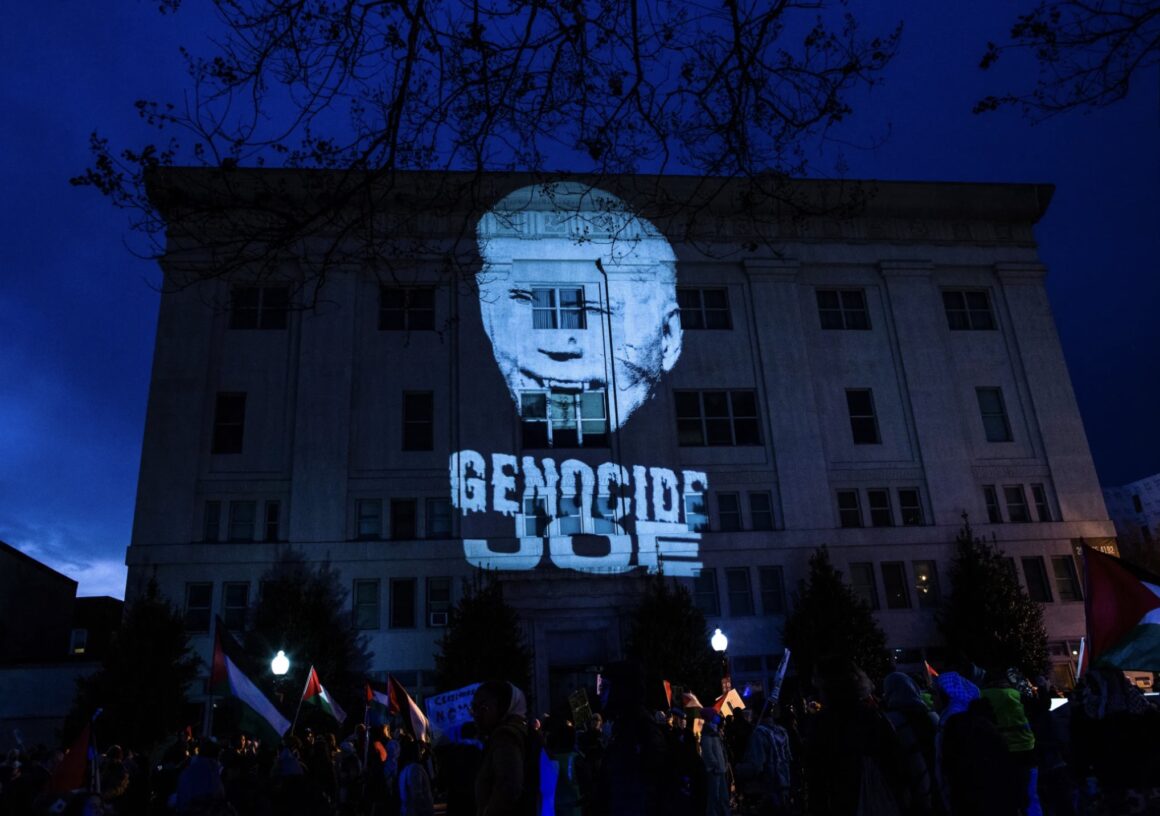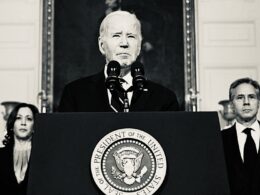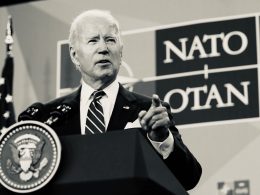A generation of young people have come to confront the vile reality of what the Democratic Party is. If you’re college-aged right now, it’s overwhelmingly likely that you’ve been able to recognize how this country’s “progressive” governmental wing represents a continuation of the most heinous crimes you’ve read about in the history books. Since the 1960s, the Democratic Party has had a role as an absorber of popular movements; as an entity which co-opts radical sentiments, diverting them towards reformist projects. Today, with the Gaza genocide, we’re witnessing exactly what reformist politics mean in a country that’s at the center of imperialism. Here, reformism means assisting in modern-day colonization. In efforts to gain wealth by murdering and forcibly displacing entire peoples.
Biden’s 2020 victory in a way represented a triumph for the liberal establishment, as the Democrats could use their post-January 6 power grab to help advance their Ukraine proxy war plans. Yet that a Democrat was in office when the Gaza genocide escalated has meant catastrophe for liberalism’s narrative dominance. There was resistance to the war crimes of Barack Obama, but during that time the antiwar movement was woefully lacking in momentum. With Biden’s overseeing of the world’s first livestreamed genocide, the younger generation’s previous lack of popular mobilization has been cured. And the majority of U.S. Americans now share a desire for the “Israeli” settler state to cease its atrocities, like how they’ve mostly come to be against aid to Ukraine. The inflation crisis, the blatant excesses of our war machine, and the readily available evidence of deliberate mass murder by “Israel” have combined to make the Zionists lose the narrative war. There’s no longer any way they can hope to bring the majority of Americans to their side.
That students are leading the resistance has proven modern young people’s capacity to overcome apathy, and has created a crisis for the liberal academic gatekeepers who seek to launder imperialism through the universities. The Zionists see an opportunity, though, in how their most vocal enemies are within this particular social category. I’m not just talking about how “Israel” defenders are trying to discredit the pro-Palestine cause by using anti-woke tropes about academia, or stereotypes about young people always being wrong. It was predictable that our enemies were going to use these cheapest of tactics. I’m also talking about the efforts to draw the pro-Palestine student activists in directions which make them end up isolating themselves from the people.
The anti-imperialist movement can overcome the increasingly prevalent anti-woke psyop, but only if we don’t embody the stereotype of activists being out-of-touch. We have to expand our struggle beyond leftist or liberal circles, and also build a base of support among people who are presently apolitical or even conservative.
We know that these students have the potential to do this because their class character is overall not a petty-bourgeois one. Their core members are working class, and I’ve seen some direct evidence of this. A campus Gaza encampment is happening in my hometown right now, and my county is an especially impoverished place. Many of the people supporting this effort are sleeping in tents due to Cal Poly Humboldt’s betrayal of low-income students. The danger is that these newly radicalized individuals will be drawn towards the ideology of petty-bourgeois radicalism, which can influence even somebody who’s proletarian.
This ideology can hold such a widespread sway because it’s based within an emotional reaction towards one’s conditions under capitalism, wherein the impulse is often to blame and scorn the people. This is how a radical makes the self-destructive error of only prioritizing the elements among the people which lack socially backward beliefs. The fear to venture outside this safe zone is at the center of what’s kept the class struggle in the United States stagnant for decades. Gus Hall, one of the Communist Party USA’s most successful 20th century leaders, wrote about where this anti-popular mindset comes from:
When the hothouse schemes of instant revolution meet reality they burst like balloons. When this happens petty-bourgeois radicalism blames its failures on the working class. In their frustration many of these sects turn to anarchism, which is only another form of petty-bourgeois radicalism. This is, in fact, one of the features of the present crisis of petty-bourgeois radicalism. Petty-bourgeois radicalism as a concept rejects the basic class nature of society and the class struggle as a pivotal element in the fight for progress. It rejects the role of mass movements because it does not see its basic ingredient–the working class. A class approach to struggle is of necessity a mass approach. The petty-bourgeois radical rhetoric is a sanctuary for those who have given up the possibilities of leading masses, and in the first place the working-class masses, in struggle. It is a way of keeping a radical image when in fact one has retreated and given up the struggle.
That’s what the Zionists, and imperialism’s other types of backers, want the student protesters to do: come into the organizing scene with idealist notions of using shortcuts towards progress, then scapegoat the people when these notions are proven wrong. The position that the bulk of these pro-Palestine activists take, wherein they seek the full abolition of the “Israeli” settler state, is totally sound; the dissolution of the settler states in South Africa, former Rhodesia, and other places has shown Zionism’s end to be possible. Likewise, the victories of the revolutionaries in Russia, China, and elsewhere have proven it doable for we in the empire’s core to overthrow our capitalist dictatorship. Those successful revolutionaries of the past, though, did not attain victory by keeping their practice confined to a series of arbitrary ideals.
Lenin and the other revolutionary leaders who’ve won have needed to struggle against the idealistic elements within their own movements. Lenin’s Left-Wing Communism: an Infantile Disorder rebuked the kinds of Marxists who believed they could win the class war while only utilizing ideologically pure trade unions. These Marxists, with their notion that it would be a betrayal to try to bring over any people who have reactionary ideas, were in essence of the same tendency as the anarchists. Both rejected crucial steps in the revolutionary process, which often led them to the conclusion that adventurist violence was justified. Trotsky was another example of this problem. He believed that the peasantry weren’t worth reaching, since the tsar had instilled them with antisemitic false consciousness. His takeaway from this idea was that the revolution can only win by becoming “permanent,” and aggressively expanding into other parts of the globe. His breed of idealism was also defeated, though a different kind of idealism ultimately brought down the USSR.
In our time and place, the main kind of idealism that threatens the revolutionary effort’s success is the one which views the masses as fundamentally reactionary. This is the perception that an activist comes to have when they lack perspective; when they view our social and cultural battles in the United States as the most important things, rather than seeing that the fight against U.S. hegemony is what we must center at this stage. Because maintaining the dominance of pro-imperialist ideas within organizing spaces is how the ruling class can keep their opposition crippled, and led by “revolutionary” orgs which the Democratic Party controls.
Not only is it impossible for us to win any of our domestic justice struggles as long as we minimize anti-imperialism’s importance; but to do so is to betray all the peoples who feel the worst of imperialism’s evils. For a concrete example of how the culture war undermines international solidarity in this way, the main left orgs have joined in on the media’s smears against the pro-Russian groups because these groups don’t conform to a certain “leftist” standard. More broadly, much of the left has fallen for the liberal ploy of separating the Palestinian people’s struggle against Zionism from the Donbass people’s struggle against Ukrainian fascism. The attitude shared by the CPUSA, the PSL, and other liberal tailist entities is that because being pro-Russia is associated with conservatives, Marxists should disavow Russia’s effort to rescue the Donbass.
The student protesters have an especially high potential to come towards rejecting such unprincipled ways of acting. This is at least true for the ones among them who aren’t already part of the anarchist “antifa” counter-gangs, which in great part view Russia as a “fascist” state and advance left-wing anti-communism. Most people who enter into a given protest movement are only beginning to figure themselves out politically, and could go in many directions. The forces of idealism can recruit students into their projects, but so can principled Marxist-Leninists. We in the latter category must make ourselves present within both these radical spaces, and the greater masses of people. Then the rule of imperialism will be truly threatened.
————————————————————————
If you appreciate my work, I hope you become a one-time or regular donor to my Patreon account. Like most of us, I’m feeling the economic pressures amid late-stage capitalism, and I need money to keep fighting for a new system that works for all of us. Go to my Patreon here.
To keep this platform effective amid the censorship against dissenting voices, join my Telegram channel.








